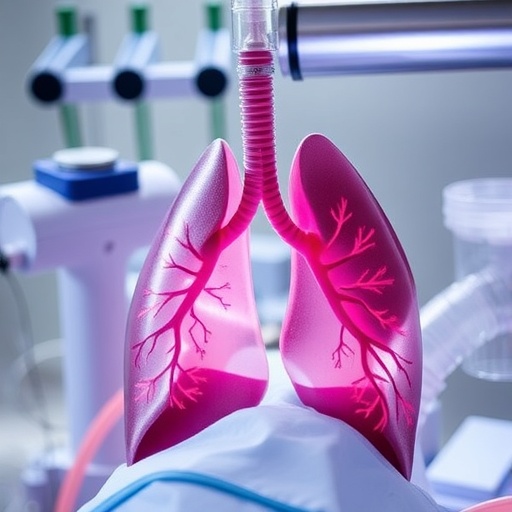In the realm of organ transplantation, recent advancements have caused a significant shift in clinical practices, particularly concerning the use of pre-transplant therapies. A study led by Kaniuk, Miyashita, and Kamar delves into the implications of employing veno-venous extracorporeal membrane oxygenation (VV-ECMO) prior to lung transplantation, a critical procedure that can drastically alter patient outcomes. This exploration sheds light on the multifaceted relationship between pre-operative support mechanisms and infection rates following lung transplantation, a topic of increasing concern in the medical community.
VV-ECMO has gained prominence as a lifesaving intervention for patients facing severe respiratory failure when conventional therapeutic strategies fail. This technology essentially serves as an artificial lung, allowing for oxygenation of the blood and removal of carbon dioxide, thus supporting patients who are not adequately compensated by mechanical ventilation alone. Utilizing VV-ECMO before lung transplantation, according to the study, could potentially enhance the patients’ physiological state during the critical window before their new organ is transplanted.
The interplay between this pre-transplant vascular support and post-operative complications, particularly infections, is crucial. Infections following lung transplantation are a significant issue, contributing to morbidity and mortality rates. The Kaniuk et al. study investigates whether this innovative support mechanism might inadvertently increase the risk of post-operative infections or, conversely, serve to reduce such occurrences. The findings could do much to inform preoperative planning and management in lung transplantation protocols.
One of the key factors considered in this study is the microbiological landscape of patients undergoing VV-ECMO. The authors postulate that patients may develop unique microbial profiles while on ECMO support due to changes in blood flow, oxygen levels, and the introduction of an artificial surface in their circulatory system. This altered microbiome could play a critical role in the susceptibility to infections in the immediate post-transplant period. Understanding the microbial dynamics while on ECMO is pivotal, paving the way for nuanced approaches to mitigate infection risks.
Compelling correlations emerged from the data analyzed in the study. With an increased incidence of certain infections noted in patients who underwent pre-transplant VV-ECMO, the authors recommend a more cautious approach within transplant protocols. By scrutinizing the causative pathogens and resistance patterns, clinicians can tailor their preventive strategies, potentially leading to improved outcomes. This shift in perspective regarding ECMO’s role is revolutionary, inviting a critical examination of long-held assumptions in lung transplantation practices.
Moreover, the study highlights the importance of continuous post-operative monitoring in ECMO-supported patients. Vigilant surveillance for infections and timely interventions are essential in optimizing patient recovery outcomes. By implementing a multidisciplinary approach to infection management, healthcare teams can significantly enhance the chances of a successful transplantation process following VV-ECMO.
The conclusive thrust of the research revolves around the balance between the immediate benefits of VV-ECMO and the potential long-term complications associated with its use. While this technology offers undeniable advantages in supporting critically ill patients, the ramifications on postoperative infection rates cannot be ignored. The findings may prompt further investigations into refining ECMO strategies and may even encourage the development of adjunctive therapies to better manage and prevent infections.
The implications of Kaniuk et al.’s research extend beyond the surgical suite. This study invites healthcare professionals to re-evaluate their protocols surrounding organ transplantation, urging a deep dive into the comprehensive management of potential pre-and post-operative complications. In a field that increasingly leans on advanced technologies, understanding the interplay of these innovations with patient outcomes remains imperative.
Furthermore, educating surgical teams on the nuanced relationship between ECMO and infection management will be foundational in effecting change in clinical practices. By adapting to new insights regarding pre-transplant support methods, medical professionals may be better equipped to undertake the complexities associated with lung transplantation.
As the landscape shifts with evolving technologies, Kaniuk, Miyashita, and Kamar’s work represents the essential dialogue between innovation and patient safety. Their contributions to understanding VV-ECMO’s role indicate the critical necessity of integrating advanced life-support technologies within a framework founded on patient-centric care practices.
In conclusion, this study stands as a beacon for future research in the field of lung transplantation, revealing paths that may lead to the enhancement of preoperative protocols and postoperative care strategies. It underscores the importance of continuous exploration and reevaluation of the tools at a clinician’s disposal in ensuring the safety and success of vulnerable patient populations undergoing transplantation.
With ongoing advancements in medical technology, the integration of insights from this study signifies a meaningful step towards optimizing patient outcomes post-lung transplantation while addressing the risks that accompany innovative practices such as VV-ECMO.
Subject of Research: Impact of pre-transplant veno-venous extracorporeal membrane oxygenation on post-lung transplant infections.
Article Title: Impact of pre-transplant veno-venous extracorporeal membrane oxygenation on post-lung transplant infections.
Article References:
Kaniuk, J.K., Miyashita, Y., Kamar, A. et al. Impact of pre-transplant veno-venous extracorporeal membrane oxygenation on post-lung transplant infections. J Artif Organs 29, 6 (2026). https://doi.org/10.1007/s10047-025-01529-4
Image Credits: AI Generated
DOI: https://doi.org/10.1007/s10047-025-01529-4
Keywords: veno-venous extracorporeal membrane oxygenation, lung transplantation, post-operative infections, microbiome, surgical protocols, patient outcomes.




